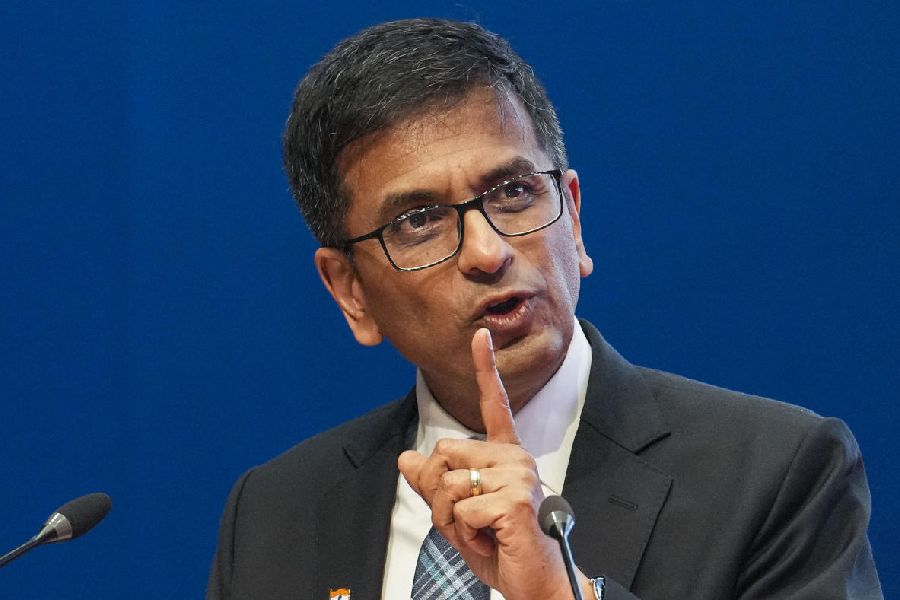The Supreme Court on Monday ruled that watching “child pornography” would henceforth be a criminal offence under the Protection of Children from Sexual Offences (Pocso) Act and could entail jail terms between three years and seven years.
“We are of the considered view that wherever a person indulges in any activity such as viewing, distributing or displaying, etc, pertaining to any child pornographic material without actually possessing or storing it in any device or in any form or manner, such act would still tantamount to ‘possession’ in terms of Section 15 of the Pocso Act if he exercised an invariable degree of control over such material, applying the aforesaid doctrine of constructive possession,” Justice J.B. Pardiwala, who authored the 200-page judgment, said.
This means a person watching child pornography can be prosecuted unless they can prove that there was no intention to watch or browse the content sent to their cellphone or any other electronic gadget. If a person inadvertently opens a link that leads to child pornographic content, he or she will have to immediately report the matter to the police for a complaint to be lodged under Section 15 of the Pocso Act against the sender.
A bench of Chief Justice D.Y. Chandrachud and Justice Pardiwala passed the judgment while dealing with appeals filed by Just Rights for Children Alliance — a coalition of five NGOs that work together against child trafficking, sexual exploitation and other allied crimes — and another organisation challenging the conflicting verdicts passed by different high courts on what constitutes a criminal offence under child pornography laws.
High courts have expressed divergent views regarding the ingredients necessary to constitute an offence under Section 15 of the Pocso Act and Section 67B of the IT Act. Kerala High Court had taken the view that mere possession or viewing of pornographic material involving a child will not fall within the ambit of Section 15 of Pocso. The court was of the opinion that the actual act of transmission or sharing of child pornography must be criminalised.
Bombay High Court had taken the view that under the Pocso Act, what is penalised is the storage of child pornography and the resultant failure to delete the content or report the matter. One-time clicking on the link without knowing what it contains is not an offence, the court said.
On Section 67B, both Karnataka High Court and Kerala High Court have held that intentional browsing or transmission of child pornography, and not the mere possession of such material, is a criminal offence.
Section 15(3) of the Pocso Act stipulates that any person who either stores or possesses any pornographic material involving a child for commercial purposes shall be punishable with imprisonment of not less than three years, which may extend up to five years, and a fine. Subsequent offences shall be punishable with imprisonment not less than five years, which may extend up to seven years, along with a fine.
The apex court on Monday made the following suggestions to the Union government in general and the ministry of women and child development in particular:
◙ Parliament should seriously consider bringing about an amendment to the Pocso Act for the purpose of substituting the term “child pornography” with “child sexual exploitation and abuse material” with a view to reflect more accurately on the reality of such offences. The Centre may consider introducing such an amendment through an ordinance
◙ The term “child pornography” shall not be used in any judicial order or judgment, instead the term “child sexual exploitation and abuse material” should be endorsed
◙ Implementing comprehensive sex education programmes that include information about the legal and ethical ramifications of child pornography can help deter potential offenders. These programmes should address common misconceptions and provide young people with a clear understanding of consent and the impact of exploitation. Providing support services to victims and organising rehabilitation programmes for offenders is essential
◙ Raising awareness about the realities of materials related to child sexual exploitation and its consequences through public campaigns can help reduce its prevalence
◙ Schools can play a crucial role in early identification and intervention. Implementing school-based programmes that educate students about healthy relationships, consent and appropriate behaviour can help prevent problematic sexual behaviour
◙ To give meaningful effect to these suggestions and work out the necessary modalities, the government may consider constituting an expert committee tasked with devising a comprehensive programme or mechanism for health and sex education, as well as raising awareness about the Pocso Act among children from an early age. This will ensure a robust and well-informed approach to child protection, education and sexual well-being.











